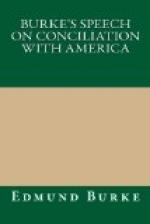Perhaps, Sir, I am mistaken in my idea of an empire, as distinguished from a single state or kingdom. But my idea of it is this; that an empire is the aggregate of many states under one common head, whether this head be a monarch or a presiding republic. It does, in such constitutions, frequently happen—and nothing but the dismal, cold, dead uniformity of servitude can prevent its happening—that the subordinate parts have many local privileges and immunities. Between these privileges and the supreme common authority the line may be extremely nice. Of course disputes, often, too, very bitter disputes, and much ill blood, will arise. But though every privilege is an exemption, in the case, from the ordinary exercise of the supreme authority, it is no denial of it. The claim of a privilege seems rather, ex vi termini, [Footnote: 38] to imply a superior power; for to talk of the privileges of a state or of a person who has no superior is hardly any better than speaking nonsense. Now, in such unfortunate quarrels among the component parts of a great political union of communities, I can scarcely conceive anything more completely imprudent than for the head of the empire to insist that, if any privilege is pleaded against his will or his acts, his whole authority is denied; instantly to proclaim rebellion, to beat to arms, and to put the offending provinces under the ban. Will not this, Sir, very soon teach the provinces to make no distinctions on their part? Will it not teach them that the government, against which a claim of liberty is tantamount to high treason, is a government to which submission is equivalent to slavery? It may not always be quite convenient to impress dependent communities with such an idea.
We are, indeed, in all disputes with the Colonies, by the necessity of things, the judge. It is true, Sir. But I confess that the character of judge in my own cause is a thing that frightens me. Instead of filling me with pride, I am exceedingly humbled by it. I cannot proceed with a stern, assured, judicial confidence, until I find myself in something more like a judicial character. I must have these hesitations as long as I am compelled to recollect that, in my little reading upon such contests as these, the sense of mankind has at least as often decided against the superior as the subordinate power. Sir, let me add, too, that the opinion of my having some abstract right [Footnote: 39] in my favor would not put me much at my ease in passing sentence, unless I could be sure that there were no rights which, in their exercise under certain circumstances, were not the most odious of all wrongs and the most vexatious of all injustice. Sir, these considerations have great weight with me when I find things so circumstanced, that I see the same party at once a civil litigant against me in point of right and a culprit before me, while I sit as a criminal judge on acts of his whose moral quality is to be decided upon the merits of that very litigation. Men are every now and then put, by the complexity of human affairs, into strange situations; but justice is the same, let the judge be in what situation he will.




